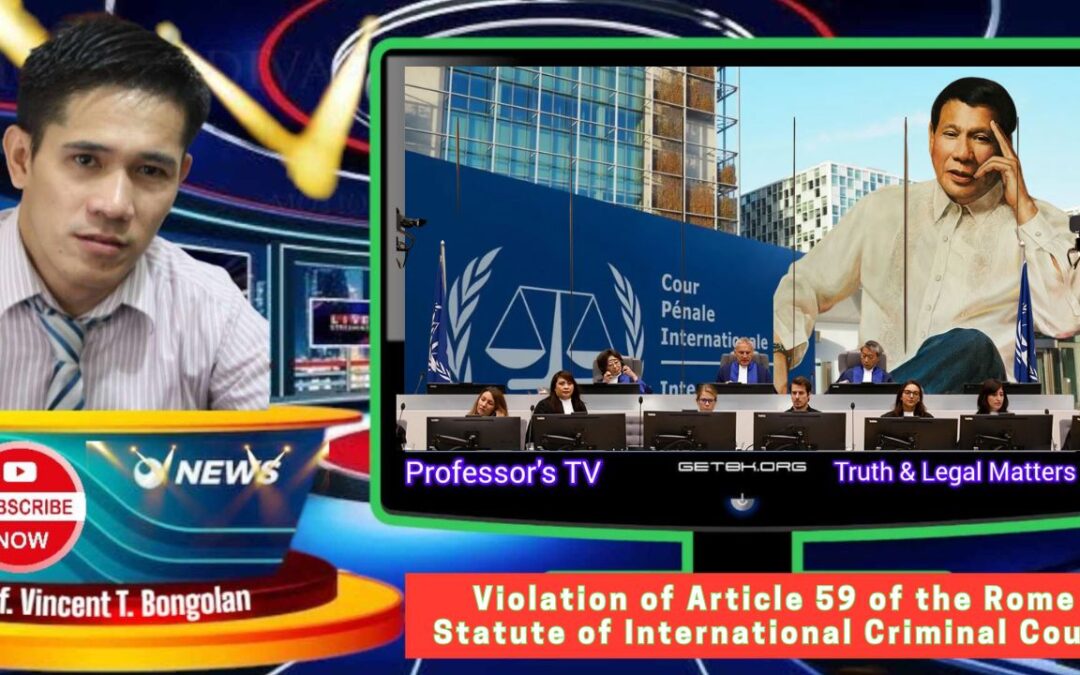Violation of Article 59 of the Rome Statute: The Unlawful Arrest of Former President Rodrigo Duterte
The recent arrest of former Philippine President Rodrigo Roa Duterte has raised serious legal and procedural concerns, particularly in relation to the Rome Statute and fundamental principles of due process. This document outlines the violations committed in the execution of the arrest and the broader implications of these actions on international legal norms and national sovereignty.
Jurisdictional Overreach of the ICC
The Philippines formally withdrew from the Rome Statute on March 17, 2019, effectively ending the International Criminal Court’s (ICC) jurisdiction over its citizens, including former President Duterte. Under international law, the ICC cannot assert jurisdiction over a non-member state unless specific conditions are met, such as a referral by the United Nations Security Council (UNSC) or a voluntary acceptance of jurisdiction by the state in question. Neither of these conditions apply in this case, making the issuance and enforcement of a warrant of arrest highly questionable.
Violation of Article 59 of the Rome Statute
Article 59 of the Rome Statute lays out clear due process protections for individuals subject to ICC arrest warrants. These include:
- Immediate review of the legality of the arrest by a competent judicial authority.
- Respect for the rights of the accused, including the right to legal representation.
- Proper notification of charges and access to the warrant of arrest.
In Duterte’s case, these procedural safeguards were blatantly ignored:
- Absence of Judicial Oversight: Upon his arrival in the Philippines from Hong Kong, former President Duterte was immediately detained by the Criminal Investigation and Detection Group (CIDG) and taken to Villamor Airbase. Instead of being presented to a competent judicial authority, he was placed under the direct custody of law enforcement, violating his right to an independent legal review of his detention.
- Denial of Legal Representation: Duterte requested access to legal counsel, specifically his daughter, Vice President Sara Duterte, to act as his legal representative. This request was denied, further violating his fundamental rights under both Philippine law and international human rights standards.
- Failure to Present a Warrant of Arrest: Police Major General Nicolas Torre III, acting under the directive of Philippine National Police (PNP) Chief Rommel Marbil, failed to provide Duterte with a copy of the warrant of arrest upon his detention. Without access to the warrant, Duterte had no way to understand the charges against him, further violating Article 59’s provisions on proper notification.
The Events Leading to the Arrest
Duterte had just returned from an event in Hong Kong, where he was accompanied by his wife and several candidates running in the 2025 Philippine elections under his political party. Upon arrival at the airport, he was intercepted by CIDG officers and taken to Villamor Airbase instead of a judicial authority. This alone constitutes a fundamental breach of his rights, as an accused individual must be presented before a competent judge for an initial review of the legality of the arrest.
The absence of any judicial oversight in the immediate aftermath of his arrest underscores a grave violation of due process. Without a formal hearing, there was no opportunity to challenge the validity of the warrant or the legitimacy of the ICC’s jurisdiction over a non-member state.
Implications for the Rule of Law
The handling of Duterte’s arrest sets a dangerous precedent, both for the Philippines and for international legal practice. The blatant disregard for due process raises questions about:
- The ability of national law enforcement agencies to act independently from external influence.
- The ICC’s commitment to respecting the sovereignty of states that have withdrawn from the Rome Statute.
- The fundamental human rights of accused individuals, regardless of their political standing.
Conclusion: A Call for Immediate Redress
The unlawful arrest of former President Rodrigo Duterte represents a clear violation of the Rome Statute, Philippine constitutional protections, and universally recognized due process rights. Given these violations, the following actions must be taken:
- Immediate release of Duterte until a proper judicial review of the arrest’s legality is conducted.
- Formal explanation from the ICC regarding the legal basis for issuing the warrant despite the Philippines’ withdrawal from the Rome Statute.
- Accountability for law enforcement officials who carried out the arrest without adhering to due process.
If the ICC and the Philippine authorities fail to correct these violations, they risk undermining their own credibility and the broader principles of international justice. Upholding the rule of law requires strict adherence to due process, not selective enforcement based on political considerations.
History will judge those who fail to act in the interest of justice. The question remains: will international and domestic authorities rectify this injustice, or will they allow political motives to overrule the fundamental rights of the accused?

